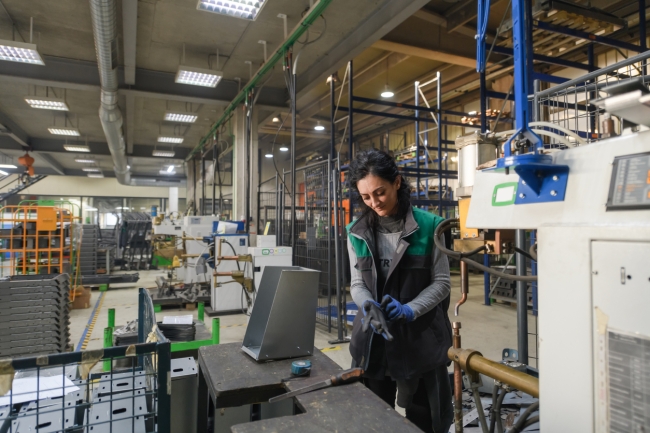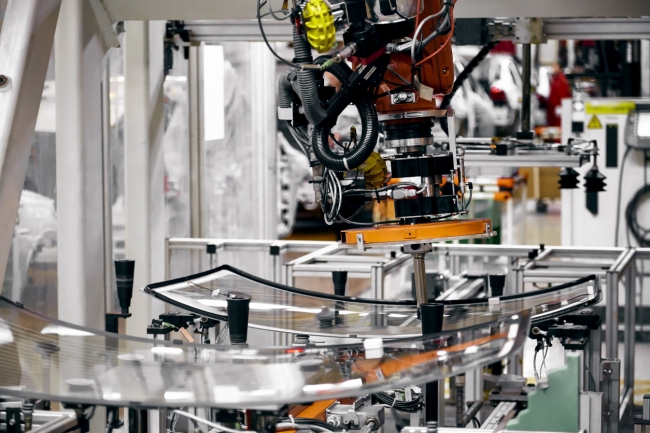5 minute read • published in partnership with Cimlogic
Insight: Sustainable manufacturing – it’s not just about net zero!
Sustainability is no longer a ‘nice to have’ opportunity for feel-good PR and communications. Manufacturers now depend on a savvy sustainability strategy and implementation as a strategic imperative; an integral part of industrial transformation and the basis for long-term, profitable growth. Cimlogic looks at why manufacturers should take a business transformation approach to sustainability.
A new global agreement (the Glasgow Climate Pact) reached at the COP26 summit in Nov 2021, set out the global agenda on climate change for the next 10 years. Firm plans were agreed upon to cut CO2 emissions, reduce coal use (which is responsible for 40% of annual CO2 emissions) and help developing countries switch to clean energy.
These positive steps highlight the urgency for manufacturers to step up their game and make progress with their net zero targets. After all, it is estimated that manufacturing operations uses somewhere in the region of 17% of UK energy consumption. Despite uncertainty on the impact that climate change action could have on production, more manufacturers are now realising that they can achieve business goals without sacrificing the needs of the planet.

Manufacturers should treat sustainability as a strategic imperative, not an add-on, and take a business transformation approach / Picture: Getty/iStock
So, where to start?
Make it real! Yes, carbon reduction and net zero are part of the agenda, but there are many other considerations for manufacturers, including utilities consumption, reducing labour turnover, capital funding, supply chain disruption etc. All these factors are part of ‘sustainable manufacturing’.
Traditional continuous improvement initiatives typically prioritise labour efficiency and productivity improvements. Shifting towards resourcing and productivity for sustainability needs additional sustainability goals and KPIs. Embedding sustainability into operations is key. Leading manufacturers integrate sustainability/ESG (Environmental, Social and Governance – measuring the sustainability and ethical impact of an investment in a company or business) into industrial transformation strategies for maximum ROI.
Manufacturers talk about three top objectives for industrial transformation and growth:
1 – Improve operational efficiency
2 – Meet customer requirements and expectations
3 – Ensure business continuity
Sustainability needs to be part of the discussion for all these objectives. Sustainability is a core transformation initiative and success will depend on how well it is integrated with the overall business growth strategy. According to LNS Research, the following are essential considerations for companies for incorporating sustainability into transformation strategies:
• Business objectives
Aligning sustainability/ESG initiatives with company business objectives is paramount
• Strategic initiatives
Identify sustainability priorities for investment based on business assessment processes. Ensure alignment with other transformation programmes such as Smart Factory and Workforce of the Future.
• Operational Architecture
Integrate sustainability into core business operations. From operational architecture (IT, OT and IIoT), to workforce planning, to advanced analytics and data-driven decision-making. Sustainability should be a common thread throughout.
• Solution Selection
Selection of appropriate digital technology solutions based on agreed business cases, with measurable ROI.
• Implementation and Change Management
A critical step in any organisational change strategy. Applying documented and proven change management processes to ensure success and drive progress.

Sustainable manufacturing has many factors including carbon reduction, net zero, utility consumption, reducing labour turnover, capital funding and supply chain disruption / Picture: Getty/iStock
LNS Research data shows that the implementation of sustainability capabilities has led to improved operational performance across industrial organisations. Solutions such as energy management, environmental emissions management, and performance management, also yield improvements in key operations KPIs such as Overall Equipment Effectiveness (OEE), Capacity Management, First Pass Yield, and Uptime.
As an example, following the integration of an energy management solution at a major client, (a 90-site enterprise with previously no visibility of energy usage), Cimlogic helped gain insight into the impact of production changeovers on energy consumption, resulting in a minimum reduction of 2.5% carbon footprint per year.
How will digital technology support your long-term sustainability goals?
Leading manufacturers looking to drive operational efficiencies, long-term growth and competitiveness are investing more in digital tools such as IIoT, robotics, automation, artificial intelligence, machine learning and edge-to-cloud. In particular, the investment in predictive manufacturing technologies is expected to grow significantly over the next 3 years. Manufacturers will benefit from the added power of data from these technologies, to provide greater insight for improvements such as increased operational efficiencies, reduced costs, CO2 waste, and resources.
As the cost of energy and materials continues to rise, manufacturers are focussing on ways to reduce their energy consumption and achieve sustainable manufacturing. Implementing factory automation and sustainable processes is key to optimising production times to minimise energy consumption, waste and reduce costs.

Leading manufacturers looking to drive operational efficiencies, long-term growth and competitiveness are investing more in digital tools / Picture: Getty/iStock
The time to act is now!
So, what to do first? Start where you are now (that’s the easy bit!) and treat sustainability as a strategic imperative, not an add-on. Take a business transformation approach: set goals for performance improvements, and implement the appropriate technology, alongside changes to people and processes, to achieve the desired returns. Make sustainability a part of operations and engage the workforce.
Manufacturers engaging in digital transformation projects typically manage a diverse portfolio of initiatives across the enterprise. Beyond energy management and emissions reduction, a balanced approach to tactical and strategic opportunities can identify ‘quick wins’ to build momentum with sustainable manufacturing.
Avoid climate tunnel-vision. Environmental sustainability (including climate risk) is critical, but manufacturers need to evaluate and prioritise the whole spectrum of sustainability risks and opportunities relevant to the organisation and business strategy.
Combining our unique RAISE™ methodology with over 20 years of technical expertise, Cimlogic can support your sustainability journey, helping you make an informed decision as to what is the right solution for your organisation, whilst ensuring maximum business value is achieved.
Click here to find out how Cimlogic can help support your sustainable manufacturing goals.

